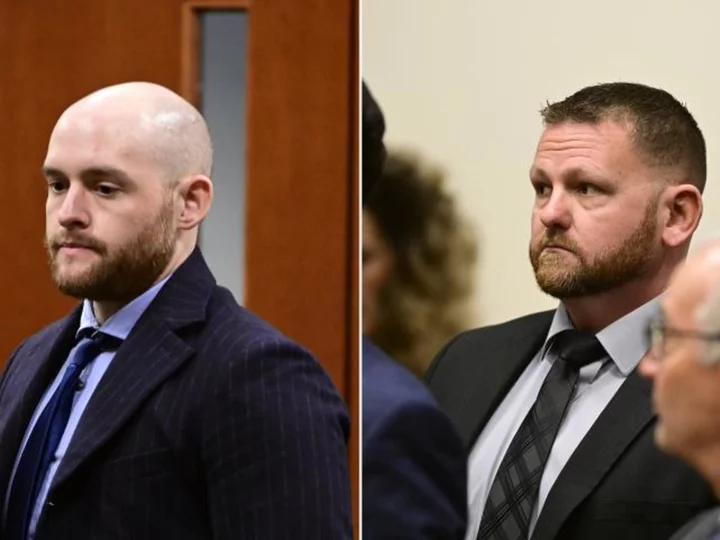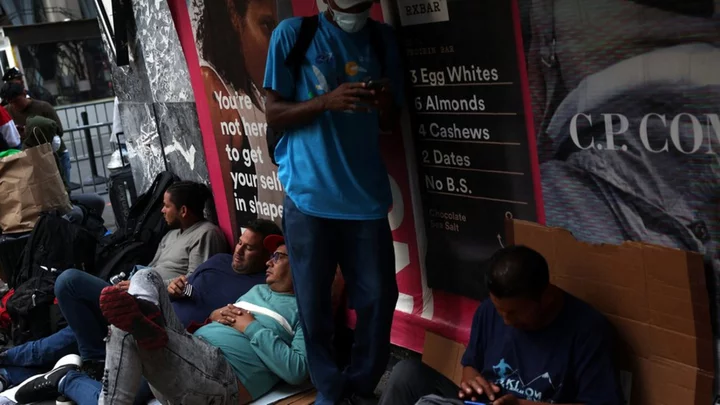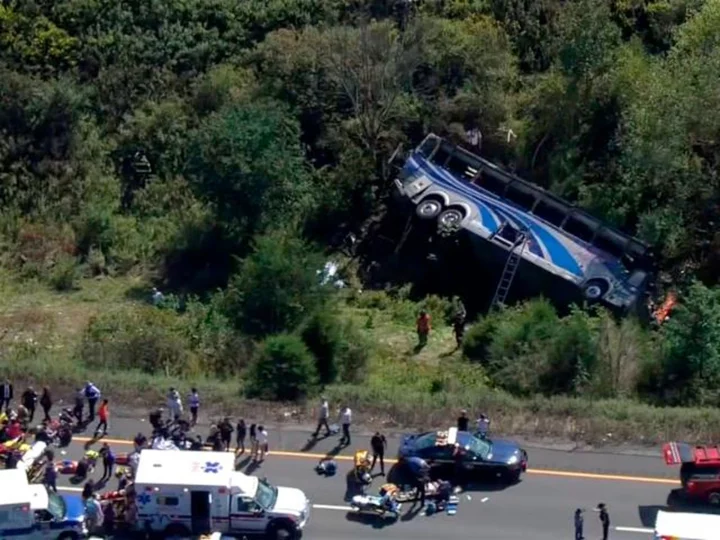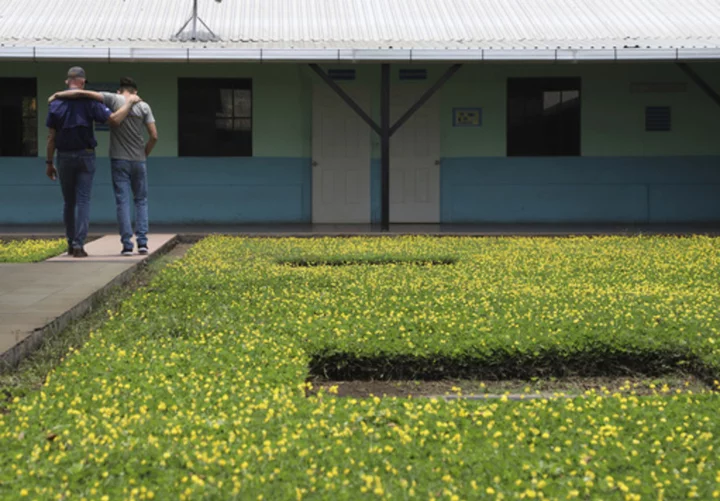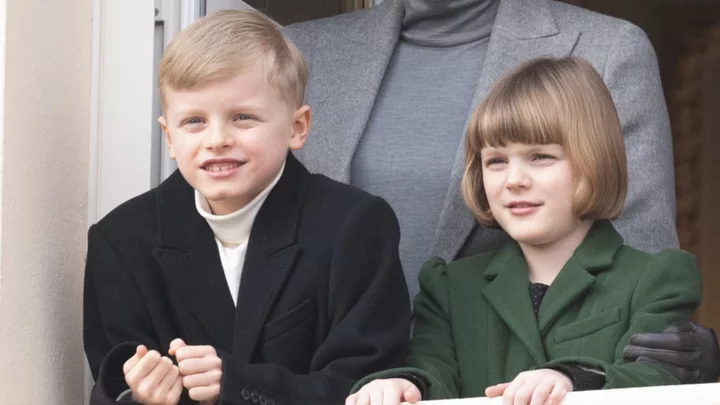Two of the Colorado police officers accused in the 2019 death of Elijah McClain began standing trial this week on criminal charges that were filed more than two years after the 23-year-old Black man died days following a physical confrontation.
A prosecutor initially declined to bring charges against any first responder in connection with McClain's death following his encounter with police in the Colorado city of Aurora, citing what he said was a lack of evidence against them, infuriating his family and civil rights advocates.
McClain, a massage therapist, was confronted by police officers on August 24, 2019, after someone reported seeing a person wearing a ski mask who "looks sketchy." After officers wrestled him to the ground and paramedics injected him with a potent sedative, McClain suffered a heart attack on the way to a hospital and died days later, authorities said.
Body camera video of the encounter shows McClain at some point saying he couldn't breathe -- a plea echoed by George Floyd in May 2020 when a Minneapolis officer kneeled on his neck for several minutes before Floyd, a Black man, took his last breath.
Floyd's murder and Breonna Taylor's killing by police in Louisville, Kentucky, in March 2020 reignited calls for charges in McClain's case as millions of people around the world swarmed the streets, protesting police violence against people of color, particularly Black Americans. Ultimately, the public pressure led Colorado's governor to order a review of the case.
After the investigation, a Colorado grand jury in 2021 indicted five first responders -- including Aurora police Officer Randy Roedema and a former officer, Jason Rosenblatt, who are on trial now -- on charges including manslaughter and criminally negligent homicide.
Aurora police Officer Nathan Woodyard is scheduled to be tried separately next month. Two paramedics who administered ketamine to McClain are expected to stand trial in November. All five defendants have pleaded not guilty.
After learning of the charges in 2021, McClain's parents were brought to tears. "I started crying because it's been two years," his mother, Sheneen McClain, said. "It's been a long journey."
Here is a timeline of how the case reached trial four years after McClain's death.
August 2019
Three White officers stopped McClain in Aurora on August 24, 2019, while he was walking home from a convenience store in the Denver suburb after 10:30 p.m., according to a police overview of the incident.
Carrying iced tea in a plastic bag, McClain eventually was in a physical struggle with the officers after, police say, he resisted arrest.
Early in the encounter, an officer told McClain to stop, and when McClain kept walking, two officers grabbed his arms, the overview reads. McClain says, "Let me go ... I'm an introvert, please respect the boundaries that I am speaking," according to body camera footage from one of the officers.
After an officer asked him to cooperate so they could talk, McClain tells officers he had been trying to pause his music so he could hear them, and tells them to let him go, the overview reads.
Eventually, one officer is heard telling another that McClain tried to grab his gun.
All three officers tackled McClain to the ground, and Woodyard placed him in a carotid hold -- in which an officer uses their biceps and forearm to cut off blood flow to a subject's brain -- police said in the overview document. McClain briefly became unconscious, and Woodyard released the hold, the document reads, citing the officers.
Because the hold was used, department policy compelled the officers to call the fire department for help, authorities said. Aurora Fire Rescue paramedics arrived and saw McClain on the ground and resisting officers, the overview says.
Paramedic Jeremy Cooper diagnosed McClain with "excited delirium" and decided to inject him with the powerful sedative ketamine, the overview says.
McClain suffered a heart attack on the way to a hospital, authorities said. Three days later, he was declared brain-dead and taken off life support.
November 2019
The Adams County coroner's office submitted an autopsy report on November 7, stating the cause and manner of death were "undetermined." The report cited the scene investigation and examination findings as factors leading to that conclusion.
Roughly two weeks later, the Adams County district attorney, Dave Young, declined to file criminal charges against any of the first responders. In a letter to the Aurora police chief on November 22, Young referred to the undetermined cause of death as one of the factors.
"The evidence does not support a conclusion that Mr. McClain's death was the direct result of any particular action of any particular individual," Young wrote. "Under the circumstances of this investigation, it is improbable for the prosecution to prove cause of death beyond a reasonable doubt to a jury of twelve. Consequently, the evidence does not support the prosecution of a homicide."
Also on November 22, after the district attorney's decision, Aurora police released the officers' body camera videos.
"We did this because obviously we think it's the right thing to do," then-Police Chief Nick Metz said during a news conference after the video was shown to reporters.
Metz also offered condolences to McClain's family: "We certainly recognize and understand that this has been an incredibly devastating and difficult process for them over these last several weeks."
February 2020
A police review board concluded that the use of force against McClain, including the carotid hold, "was within policy and consistent with training."
City officials announced on February 6 they would hire an independent expert to review the case.
June 2020
On June 9, Aurora police and city officials announced changes to police policies, including a ban on carotid holds.
Ten says later, Colorado Gov. Jared Polis signed police accountability legislation into law, requiring all officers to use activated body cameras or dashboard cameras during service calls or officer-initiated public interactions. The measure also barred officers from using chokeholds.
In a pivotal move, Polis signed an executive order appointing Colorado Attorney General Phil Weiser to investigate McClain's case, the governor announced on June 25.
The governor's decision came after more than 2 million people signed a petition urging officials to conduct a new investigation.
Earlier in June, the three officers who confronted McClain were assigned to administrative duties, primarily due to safety concerns because police and city employees were receiving threats, a police spokesperson said.
On June 27, protesters in the Aurora area gathered on Highway 225, temporarily shutting it down in a demonstration calling for justice in McClain's death.
On June 30, the US attorney's office for Colorado, the US Department of Justice's civil rights division and the FBI's Denver division announced they have been reviewing the case since 2019 for potential federal civil rights violations.
July 2020
Aurora police on July 3 fired two officers who they say snapped selfie photographs at McClain's memorial site, located where he was killed, while they were on duty.
Jason Rosenblatt -- the former officer now on trial -- also was fired, with police saying he received the photo in a text and replied, "ha ha," and did not notify supervisors. The photos were taken on October 20, 2019.
A third officer seen in the photos resigned days before a pre-disciplinary hearing, police said.
On July 20, the Aurora City Council approved a resolution for an independent investigation of McClain's death to proceed.
August 2020
The McClain family filed a federal civil rights lawsuit against the city of Aurora on August 11.
"Aurora's unconstitutional conduct on the night of August 24, 2019, is part of a larger custom, policy, and practice of racism and brutality, as reflected by its conduct both before and after its murder of Elijah McClain, a young Black man," the lawsuit stated.
On the same day, Aurora city officials announced the police department would undergo a "comprehensive review" by external experts on civil rights and public safety.
February 2021
Aurora city officials released a 157-page report on February 22, detailing the findings of the independent investigation it commissioned into McClain's death.
The report asserted that officers did not have the legal basis to stop, frisk or restrain McClain. It also criticized emergency medical responders' decision to inject him with ketamine and rebuked the police department for failing to seriously question the officers after the death.
Sheneen McClain, Elijah's mother, cried while reading the report.
"It was overwhelming knowing my son was innocent the entire time and just waiting on the facts and proof of it," Sheneen McClain told CNN at the time. "My son's name is cleared now. He's no longer labeled a suspect. He is actually a victim."
Elijah McClain's father said the report only confirmed what the family already knew. "The Aurora police and medics who murdered my son must be held accountable," LaWayne Mosley said after the report's release.
In response to the report, city officials began work on establishing an independent monitor to scrutinize police discipline, Aurora City Manager Jim Twombly said.
"I believe the investigative team has identified the issue that is at the root of the case: the failure of a system of accountability," Twombly said after the report's release.
September 2021
On September 1, the state attorney general announced a grand jury indicted the three officers -- Roedema, Rosenblatt and Woodyard -- and the two paramedics, Peter Cichuniec and Cooper.
Each was charged with manslaughter and criminally negligent homicide as part of a 32-count indictment.
Roedema and Rosenblatt also were indicted on one count of assault and one count of crime of violence. And Cooper and Cichuniec were also indicted on three counts of assault and six counts of crime of violence.
"Our goal is to seek justice for Elijah McClain, for his family and friends and for our state," Weiser, the state attorney general, said. "In so doing, we advance the rule of law and our commitment that everyone is accountable and equal under the law."
McClain's father, Mosley, wept after hearing about the indictment, his attorney said in a news release.
"Nothing will bring back my son, but I am thankful that his killers will finally be held accountable," Mosley said through the attorney's release.
On September 15, the Colorado attorney general's office released a 112-page report that found the Aurora police had a pattern of practicing racially biased policing, excessive force, and had failed to record legally required information when interacting with the community.
The report also found the police department used force against people of color almost 2.5 times more than against White people.
The state investigation also revealed the fire department had a pattern and practice of administering ketamine illegally, the attorney general's office said.
The city and the attorney general's office had 60 days to negotiate a consent decree that would mandate changes to resolve the issues, the office said.
November 2021
The state attorney general's office and the city of Aurora agreed November 16 on terms of a consent decree to address the issues raised in the office's report two months earlier.
On November 19, the city finalized an agreement to pay $15 million to McClain's family to settle the federal civil rights lawsuit.
September 2022
The cause of death in McClain's case was changed in light of evidence from the grand jury's investigation, according to an amended autopsy report publicly released September 23.
The initial autopsy report had said the cause of death was undetermined. The amended report now listed "complications of ketamine administration following forcible restraint" as the cause of death.
The manner of death remained undetermined in the amended report.
"Simply put, this dosage of ketamine was too much for this individual and it resulted in an overdose, even though the blood ketamine level was consistent with a 'therapeutic' concentration," pathologist Dr. Stephen Cina wrote in the amended autopsy report. "I believe that Mr. McClain would most likely be alive but for the administration of ketamine."
Cina could not determine whether the carotid hold contributed to the death, but "I have seen no evidence that injuries inflicted by the police contributed," he wrote.
The amended report was signed by the Adams County chief coroner, Monica Broncucia-Jordan, with a July 15, 2021, date handwritten beside her name.
It was made publicly available in September 2022 after a court approved the release. The coroner had said she needed court approval to release it because she was barred from revealing information from the grand jury.

